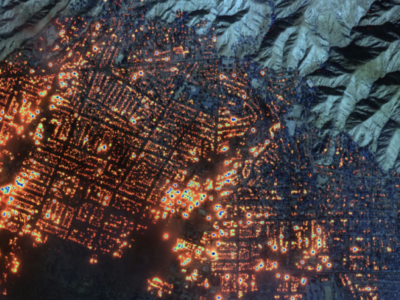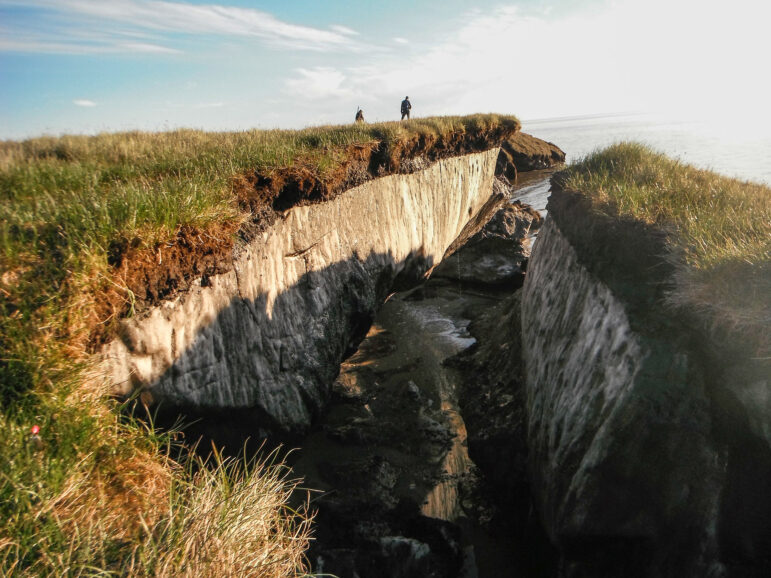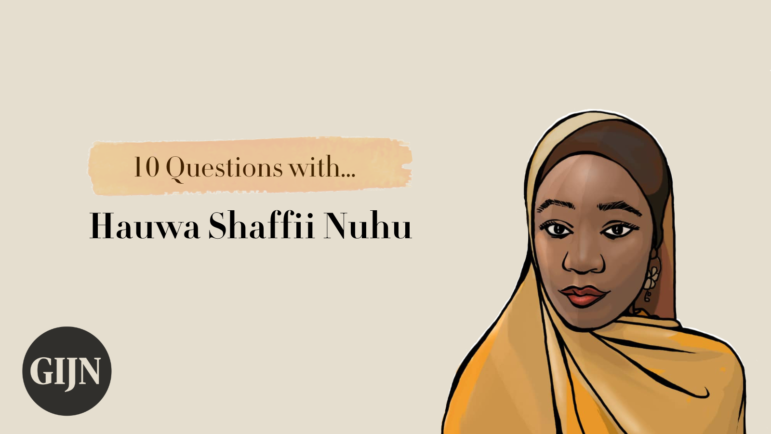
Investigative journalists in Africa have to bear many blows — from repressive governments, corporations trying to silence them, travel and visa restrictions, physical attacks, lawsuits such as SLAPPs, limited funding, and skill and training gaps.
Still, they have found ways to overcome those challenges. African investigative journalists have consistently produced impactful stories — year after year after year — while also devising strategies to grow their audiences.
Investigative journalists face threats all over the world, but in many African countries it’s a particularly dangerous fight. African investigative journalists have paid with their lives for their efforts to hold leaders accountable — in Ghana, Cameroon, Rwanda, and several other countries. Nearly 50 African journalists languish in prison, according to the Committee to Protect Journalists (CPJ)’s most recent count of incarcerated journalists. Many African journalists have had to avoid death or imprisonment by going into exile.
Coinciding with the International Day to End Impunity for Crimes Against Journalists, the 450 participants from 55 countries who attended the recent African Investigative Journalism Conference (AIJC) in Johannesburg, South Africa, released a statement to draw “urgent attention” to the dangerous circumstances in which journalists operate in many parts of the continent, calling on governments to release imprisoned journalists and for international organizations to establish a mechanism for prosecuting crimes against journalists in Africa.
These dangers have not stopped African investigative journalists from doing challenging and exceptional work. Recent examples of notable investigative stories from Africa include:
- iWatch Africa’s report exposing the sea turtle poaching crisis and illegal trade in Ghana. Three days after the story was published, police arrested the mastermind of the trade in sea turtles.
- An investigation by the International Centre for Investigative Reporting (ICIR) that exposed corruption in the Nigerian police and held to account former inspectors general of the police.
- A two-part report by New Narratives that sought to dig into the failure of a US$3 million project funded by the European Union (EU) to solve Liberia’s waste collection crisis.
- The Makanday Centre for Investigative Journalism’s exposé on the controversial mining project the government authorized to start at the Lower Zambezi National Park. The story led to the cancellation of the contentious mining license.
- Inkyfada’s investigation (in which they collaborated with Le Monde and The Washington Post) into the forced, violent expulsions of migrants at Tunisia’s borders, which sparked essential discussions about the role of the EU in enabling these violations.
- The Centre for Investigative Journalism Malawi’s probe into the alleged abuse of COVID-19 funds in the country’s northern city of Mzuzu found that considerable sums of money could not be accounted for.
- And at the 2024 African Investigative Journalism Conference, Ugandan journalist Blanshe Musinguzi scooped the African Investigative Journalist of the Year award for his serialized story, How Congo Trees Are Smuggled into East Africa.
GIJN’s mission is to provide the organizational backbone for investigative journalism and it has 26 Africa-based members, spread far and wide — from Gambia in West Africa to Tunisia in the north to Zimbabwe in the southwest to Mozambique in the southeast. For this story, GIJN spoke to newsroom leaders, editors, and reporters from our African member organizations about what distinguishes investigative journalism on the continent and the challenges they face.
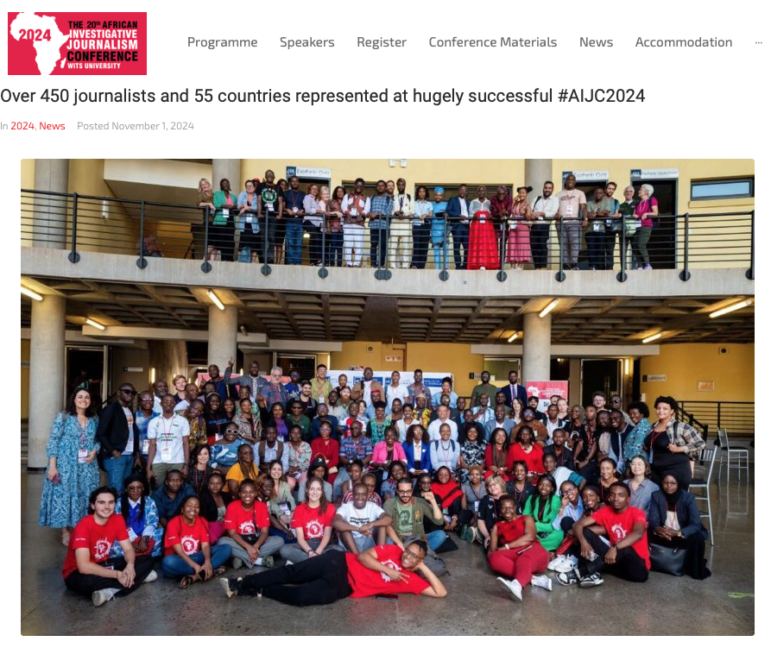
Hundreds of journalists from more than 50 countries attended the most recent African Investigative Journalism Conference in Johannesburg, South Africa, from October 30 – November 1, 2024. Image: Screenshot, AIJC
What Makes Investigative Reporting in Africa Unique?
Several GIJN members cited resilience as a quality that characterizes investigative journalism conducted in Africa, as they face serious infringements on their rights — and worse — in doing their work.
The executive director of Tunisia-based Inkyfada, Malek Khadhraoui, notes: “The best investigative journalism in the MENA region stands out for its resilience, collaboration, and the courage required to operate in a highly challenging environment,” where “authoritarianism, censorship, and threats to journalists are prevalent.”
“Investigative journalism here is also deeply connected to social justice and community involvement,” he adds.
Social justice is an important element in investigative journalism in West Africa too. “What distinguishes investigative journalism in West Africa is its focus on exposing corruption, human rights abuses, and environmental challenges that are often deeply entrenched in the region,” says co-founder of Ghana’s iWatch Africa, Gideon Sarpong. “Journalists here navigate immense political, social, and economic pressures to bring critical stories to light, often at personal risk.”
Editor-in-chief of New Narratives in Liberia, Prue Clarke, works with a crop of brave reporters who don’t let intimidation — a significant occupational hazard — interfere with their work. “Getting access to information and staring down threats [are] dominant factors in the region,” says Clarke. “But when good journalism is done, it can have a tremendous impact.”
Rahma Behi, the head of the international investigations department at Alqatiba in Tunisia, also says they operate despite threats, and rising populism on the continent. “Despite a challenging environment marked by rising populism and government pressures, we remain unwavering in our pursuit of truth… Even the smallest change fueled by our work is a victory in our eyes.”
Internal and External Challenges
Luís Nhachote, the executive coordinator of the Centro de Jornalismo Investigativo in Mozambique, notes that investigative journalism in Africa faces two kinds of challenges, both internal — such as funding and resource constraints in a changing and commercial media environment — and external — such as laws, policies, and restrictive media environments. He cites safety and the lack of a right to access to information as the main challenges locally.
Other external challenges include legal and political repression, restricted access to information, ever-shrinking spaces for freedom of expression, and lawsuits or other legal actions intended to silence or bankrupt journalists and their organizations — such as SLAPP suits, which Dayo Aiyetan, executive director of Nigeria’s International Centre for Investigative Reporting, cites along with “state repression and clampdowns on media,” as major obstacles facing journalists in Nigeria.
Charles Mafa, managing partner for the Makanday Centre for Investigative Journalism in Zambia, says that another systemic challenge facing the profession on the continent, along with political and business interests influencing the press, is the “lack of a curriculum for investigative journalism in Zambian colleges and universities.”
Behi, from Alqatiba, says more attention needs to be paid to the questions of the future financial sustainability of investigative journalism in Tunisia and other parts of Africa.
“With the current economic challenges and the restrictions on foreign funding [in Tunisia], it is becoming harder to secure the necessary resources for long-term investigations,” she explains. “Without sufficient funding and protection, many media organizations might not survive, and this could undermine the ability to produce in-depth, high-quality reporting.”
Inkyfada’s Khadhraoui, also from Tunisia, agrees. “If we could secure diversified and independent funding sources, whether through technology-driven revenue models, grants, or direct audience support, it would provide a much-needed safety net for investigative journalism in the region.”
In West Africa, Senegal-based La Maison des Reporters has been experimenting with a business model based exclusively on donations from the public. They don’t accept grants from institutions — which they try to “keep at arm’s length” because the site operates in a climate marked by “mistrust of journalistic work, whatever its quality,” says La Maison des Reporters coordinator Moussa Ngom. Their particular challenge, he adds, is “maintaining our business model, based on public donations and the quality of our production, at all costs.”
Collaborating Beyond Countries — and Continents
As in other parts of the world, cross-border investigative collaborations are on the rise in Africa — and several African outlets and regional associations actively facilitate or support such investigations — but the infrastructure for cross-border collaborations varies between regions, and members note that more can be done to promote intra-African collaboration without international partners.
It’s notable that several collaborative investigations cited by GIJN member organizations involved partnerships with groups outside Africa. Zambia’s Makanday, as well as other outlets from southern Africa, worked together with the ICIJ to produce the Swazi Secrets investigation; Tunisia’s Alqatiba collaborated with the Organized Crime and Corruption Reporting Project (OCCRP) on a series of cross-border investigations that culminated in the Dubai Unlocked international exposé; iWatch Africa partnered with Lighthouse Reports from The Netherlands for a story about Europe’s funding of EU-banned pesticides in Ghana.
Collins Mtika, editorial director of the Centre for Investigative Journalism Malawi, cautions that competition to break “exclusive” stories remains a local obstacle to further collaboration. “Investigative journalists in Malawi still resist or do not want to collaborate with colleagues,” he points out. “The competitive interest is so inherent that the public interest is never considered when doing stories.”
Malek Khadhraoui, of Inkyfada, notes that there is an established culture of cross-border collaborations in the Middle East and North Africa (MENA) region, orchestrated by networks such as Arab Reporters for Investigative Journalism (ARIJ).
“These collaborations allow journalists to tackle complex topics such as corruption, human rights abuses, and organized crime, which often transcend national boundaries,” he explains. “Working with international partners like the ICIJ or OCCRP, investigative journalists in the MENA region can access advanced tools and global expertise, making it possible to expose stories that might otherwise remain hidden due to local restrictions.”
According to Khadhraoui, collaborating with international watchdog journalism networks has another advantage: accelerating innovation in the region through the increased focus on the use of modern digital and data journalism, along with other modern investigative resources. “This is critical for uncovering financial crimes and corruption that require sophisticated data analysis, making investigative journalism a vital tool for transparency and accountability in the region,” he notes.
In West Africa, the Norbert Zongo Cell for Investigative Journalism in West Africa (CENOZO) is already connecting muckraker reporters to work together in a highly volatile region where four countries have suffered coups d’état in recent years, and where military rule has made it even harder to do independent journalism.
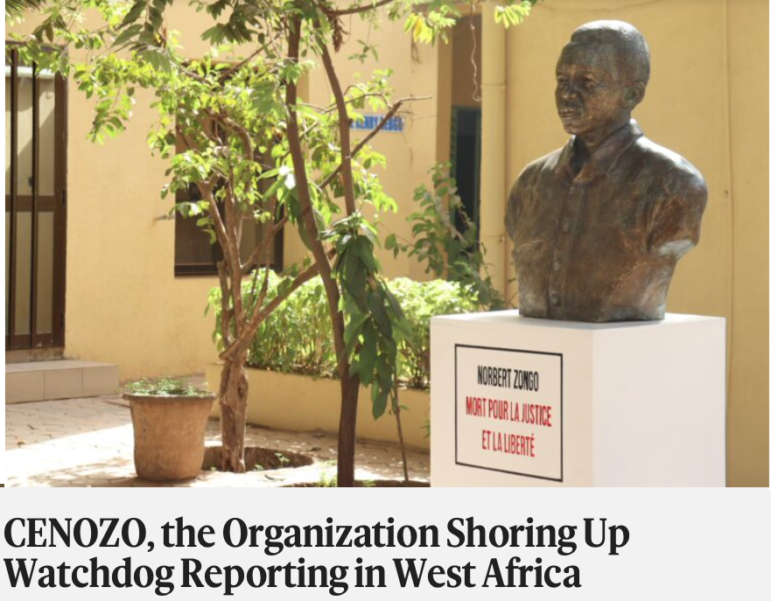
CENOZO, based in West Africa, is one of a number of journalism organizations on the continent that works to train reporters and foster more collaborative investigations across national borders. Image: Screenshot, GIJN
For South Africa’s Oxpeckers Investigative Environmental Journalism, a considerable amount of the stories for their #PowerTracker reporting project over the past two years are a result of collaborations with journalists in Mozambique, Zimbabwe, South Africa, Namibia, and the Democratic Republic of the Congo.
Nigeria’s ICIR collaborates locally with complimentary media organizations such as Signature Television to amplify their reporting and multimedia content distribution capacity. New Narratives has developed a network of more than 10 newsrooms in Liberia, Ghana, and other West African countries in which they syndicate content, while seven of the investigative journalism centers in Southern Africa are members of the IJ Hub, the region’s rallying point for collaborative journalism.
There are plans to improve and support more cross-border collaborative investigations.
At AIJC24, the director of the Wits Centre for Journalism, Dinesh Balliah, announced the formation of an African Investigative Journalism Network (AIJN), saying it will “cater for the urgent needs faced by many freelance journalists on the continent, who lack organizational backing and institutional association to access funding for their critical investigative journalism projects.”
In East Africa, Kenya-based Africa Uncensored is spearheading the East Africa Investigative Journalism Network, which will be launched at an inaugural regional watchdog journalism conference in Mombasa, Kenya, in early December 2024.
Training, Innovation, What’s Next
To combat the gaps in training opportunities and skills shortfalls, several African GIJN members have focused on developing skills and training for young journalists. ICIR says they have trained over 1,000 journalists in scores of newsrooms and funded some 2,000 investigative projects since the organization was formed in 2010; iWatch Africa has trained over 200 journalists, equipping them with skills in digital rights, data journalism, and investigative reporting (and offered reporting grants to numerous journalists).
Anton Harber, GIJN board member and CEO of South Africa’s Henry Nxumalo Foundation, which gives grants for investigative journalism, states: “Our major achievement is that over 15 years we have supported over 90 projects, some of which have had a major impact” — such as the Viewfinder investigation into police criminality (a 2023 Global Shining Light Award winner) and a Daily Maverick influence-for-hire investigation.
Oxpeckers, Africa’s first investigative unit focusing on environmental issues, has developed their own training resources for data analysis and geo-mapping, among others. Oxpeckers Executive Director Fiona Macleod states: “Our 13 data-driven tools inform our reportage that is published online and through media partners, with the underlying evidence and other source materials available to other media and environmental guardians for use in their own work.”
Other tools that African investigative newsrooms have embraced include:
- AI, which is helping small newsrooms with routine tasks and data visualization tools, for automating transcription and translation tasks, improving the efficiency of cross-language investigations, and content verification, especially when fact-checking large amounts of visual or textual data from diverse sources.
- Advanced data analysis software and programming languages such as Python, R, and Tableau to analyze large datasets while investigating trends in financial corruption, migration, and political accountability.
- Open-source research tools to track digital footprints, verify information, and gather publicly available data, especially when investigating hidden networks or government-related corruption.
- Governments’ online platforms, initially introduced to provide public services online, these resources have become useful for retrieving essential documents, such as company and land records, without the need for in-person visits to government offices.
- Encryption tools like PGP (Pretty Good Privacy) and secure messaging apps (Signal, Wire) to protect sensitive sources and ensure the security of ongoing investigative work due to growing concerns over surveillance and press freedom.
Despite the huge diversity in responses, there are some common threads on GIJN members’ wishlists for improving watchdog reporting on the continent. These include:
- Improving funding across Africa to support, train, and mentor the next generations of investigative journalists.
- Enacting political and legislative reforms that protect press freedom and shield journalists from harassment or repression.
- Deploying more AI tools for news reporting, fact-checking, and publishing operations.
- Establishing and upholding high ethical standards to enhance the credibility and trustworthiness of investigative journalism.
- Providing more secure communication tools and data analysis techniques so investigative journalists can work more efficiently and safely.
Being proactive on multiple fronts is key to improving investigative journalism in African countries — starting with recruiting and training young journalists, notes Mtika of the Centre for Investigative Journalism Malawi.
“We need to keep attracting a cadre of upcoming journalists and continue mentoring them,” Mitka explains. “We also need to enhance our networking and collaborations with investigative journalists within the country and the region… [and] we need to continuously participate in international workshops and webinars so that we keep up with trends in investigative journalism.”




